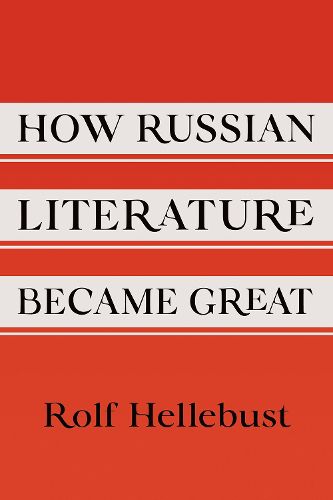Readings Newsletter
Become a Readings Member to make your shopping experience even easier.
Sign in or sign up for free!
You’re not far away from qualifying for FREE standard shipping within Australia
You’ve qualified for FREE standard shipping within Australia
The cart is loading…






How Russian Literature Became Great explores the cultural and political role of a modern national literature, orchestrated in a Slavonic key but resonating far beyond Russia's borders.
Rolf Hellebust investigates a range of literary tendencies, philosophies, and theories from antiquity to the present: Roman jurisprudence to German Romanticism, French Enlightenment to Czech Structuralism, Herder to Hobsbawm, Samuel Johnson to Sainte-Beuve, and so on. Besides the usual Russian suspects from Pushkin to Chekhov, Hellebust includes European writers: Byron and Shelley, Goethe and Schiller, Chateaubriand and Baudelaire, Dante, Mickiewicz, and more.
As elsewhere, writing in Russia advertises itself via a canon of literary monuments constituting an atemporal "ideal order among themselves" (T.S. Eliot). And yet this is a tradition that could only have been born at a specific moment in the golden nineteenth-century age of historiography and nation-building. The Russian example reveals the contradictions between immutability and innovation, universality and specificity at the heart of modern conceptions of tradition from Sainte-Beuve through Eliot and down to the present day.
The conditions of its era of formation-the prominence of the crucial literary-historical question of the writer's social function, and the equation of literature with national identity-make the Russian classical tradition the epitome of a unified cultural text, with a complex narrative in which competing stories of progress and decline unfold through the symbolic biographical encounters of the authors who constitute its members. How Russian Literature Became Great thus offers a new paradigm for understanding the paradoxes of modern tradition.
$9.00 standard shipping within Australia
FREE standard shipping within Australia for orders over $100.00
Express & International shipping calculated at checkout
How Russian Literature Became Great explores the cultural and political role of a modern national literature, orchestrated in a Slavonic key but resonating far beyond Russia's borders.
Rolf Hellebust investigates a range of literary tendencies, philosophies, and theories from antiquity to the present: Roman jurisprudence to German Romanticism, French Enlightenment to Czech Structuralism, Herder to Hobsbawm, Samuel Johnson to Sainte-Beuve, and so on. Besides the usual Russian suspects from Pushkin to Chekhov, Hellebust includes European writers: Byron and Shelley, Goethe and Schiller, Chateaubriand and Baudelaire, Dante, Mickiewicz, and more.
As elsewhere, writing in Russia advertises itself via a canon of literary monuments constituting an atemporal "ideal order among themselves" (T.S. Eliot). And yet this is a tradition that could only have been born at a specific moment in the golden nineteenth-century age of historiography and nation-building. The Russian example reveals the contradictions between immutability and innovation, universality and specificity at the heart of modern conceptions of tradition from Sainte-Beuve through Eliot and down to the present day.
The conditions of its era of formation-the prominence of the crucial literary-historical question of the writer's social function, and the equation of literature with national identity-make the Russian classical tradition the epitome of a unified cultural text, with a complex narrative in which competing stories of progress and decline unfold through the symbolic biographical encounters of the authors who constitute its members. How Russian Literature Became Great thus offers a new paradigm for understanding the paradoxes of modern tradition.